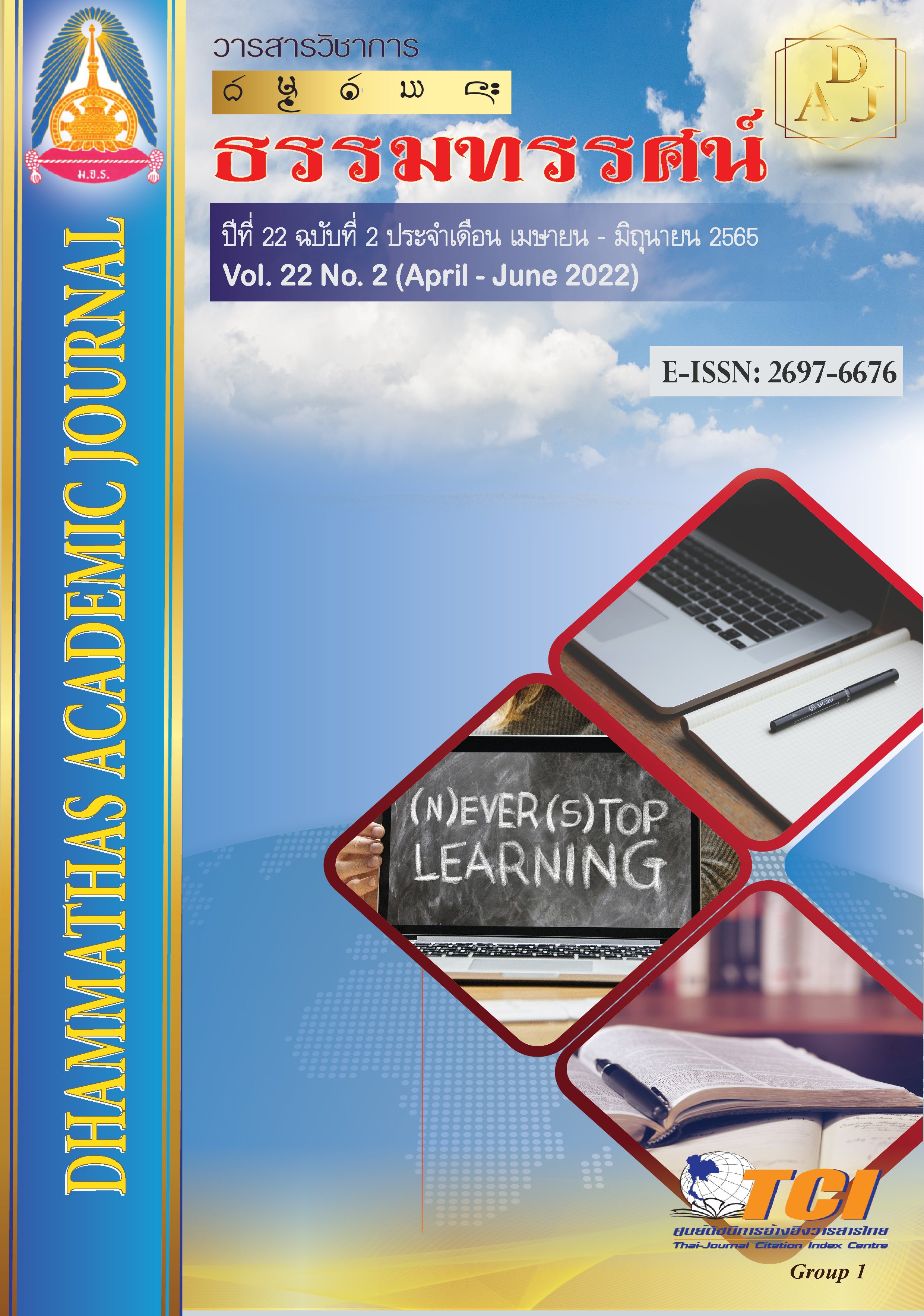Integrating Buddhist Principles and Activities to Promote Health and disease Prevention Depression of the Elderly in Chiang Mai Province
Main Article Content
Abstract
The purposes of this research were: 1) to examine condition of dharma principles and Buddhist activities. To promote health and prevent depression of the elderly in Chiang Mai, 2) to examine condition integrate Buddhist principles and activities for health promotion and prevention of depression in the elderly in Chiang Mai It is a mixed research method. Both quantitative research and qualitative research the samples used in the research by specific sampling method by choosing a specific study is. Sangha governing Mae Sa sub-district Abbot of Mae Saluang Temple and monks, preachers of the School for the Elderly, Mae Sa Sub-district, Mae Rim District, Chiang Mai Province by using the interview form together with group conversations It is a tool for collecting information. As for the quantitative data, 85 questionnaires were collected and qualitative data were collected to coordinate for in-depth interview appointments. In the quantitative data, computer statistical analysis was used to find the percentage, mean and standard deviation and qualitative data using descriptive analysis methods.
The results revealed that:
1. Most of the elderly people in the community did not have depression. Schools for the elderly were promoted by joint network partners, namely the Sub-District Administrative Organization, the Sangha and the Tambon Health Promoting Hospital and preliminary ordinance training activities for the elderly it helps to improve health and prevent depressive symptoms of the elderly in.
2. Integrating Dharma principles. They do not fall in love with materialism in the era of globalization and can alleviate depression through Buddhist activities, namely meditation, which is Samatha meditation by practicing meditation to suppress all defilements and feelings and introspection through ariyas, standing, walking, sitting and lying, suitable for the elderly Research Recommendations Sangha administrators should pay more attention to the promotion and development of the elderly. And the community should work together to develop a plan for the development of the elderly in the community. for continuous care for the elderly by using dharma principles and Buddhist activities to enhance health and prevent depression in the elderly.
Article Details

This work is licensed under a Creative Commons Attribution-NonCommercial-NoDerivatives 4.0 International License.
เพื่อให้เป็นไปตามกฎหมายลิขสิทธิ์ ผู้นิพนธ์ทุกท่านต้องลงลายมือชื่อในแบบฟอร์มใบมอบลิขสิทธิ์บทความ ให้แก่วารสารฯ พร้อมกับบทความต้นฉบับที่ได้แก้ไขครั้งสุดท้าย นอกจากนี้ ผู้นิพนธ์ทุกท่านต้องยืนยันว่าบทความ ต้นฉบับที่ส่งมาตีพิมพ์นั้น ได้ส่งมาตีพิมพ์เฉพาะในวารสาร วิชาการธรรม ทรรศน์ เพียงแห่งเดียวเท่านั้น หากมีการใช้ ภาพหรือตารางของผู้นิพนธ์อื่นที่ปรากฏในสิ่งตีพิมพ์อื่นมาแล้ว ผู้นิพนธ์ต้องขออนุญาตเจ้าของลิขสิทธิ์ก่อน พร้อมทั้ง แสดงหนังสือที่ได้รับการยินยอมต่อบรรณาธิการ ก่อนที่บทความจะได้รับการตีพิมพ์References
กรมสุขภาพจิต กระทรวงสาธารณสุข. (2560). สุขภาพจิตไทย พ.ศ.2546-2550. กรุงเทพฯ: องค์การรับส่งสินค้าและพัสดุภัณฑ์.
ประภัสสร กิมสุวรรณวงศ์. (2555). การดูแลสุขภาพแบบองค์รวมของผู้สูงอายุตามแนวคิดทางพระพุทธศาสนา. วารสารบัณฑิตศึกษาปริทรรศน์, 8(3), 19-42.
มูลนิธิสถาบันวิจัยและพัฒนาผู้สูงอายุไทย. (2556). รายงานประจำปี สถานการณ์ผู้สูงอายุไทย พ.ศ. 2555. นนทบุรี: เอสเอส พลัส มีเดีย.
ภิรมย์ เจริญผล. (2553). ศึกษาวิเคราะห์หลักพุทธธรรมที่ใช้ในการดำเนินชีวิตของผู้สูงอายุ: กรณีศึกษา
ผู้สูงอายุในสถานสงเคราะห์ จังหวัดนครปฐม. (วิทยานิพนธ์พุทธศาสตรมหาบัณฑิต). พระนครศรีอยุธยา: มหาวิทยาลัยมหาจุฬาลงกรณราชวิทยาลัย.
พระภูชิสสะ ปญฺญาปโชโต. (2562). การเสริมสร้างสุขภาวะตามหลักภาวนา 4 ของผู้สูงอายุในตำบลยางฮอม อำเภอขุนตาล จังหวัดเชียงราย. วารสาร มจร การพัฒนาสังคม, 4(1), 49-63.
พระราเชนทร์ วิสารโท. (2560). บูรณาการพุทธธรรมกับระบบการดูแลสุขภาพระยะยาว สำหรับผู้สูงอายุของอำเภอศรีวิไล จังหวัดบึงกาฬ. วารสารมหาจุฬาวิชาการ, 4(2), 76-91.
สมจิตร เสริมทองทิพย์ และคณะ. (2560). ผลของโปรแกรมการบำบัดทางปัญญาบนพื้นฐานของสติต่อภาวะซึมเศร้าในผู้เป็นเบาหวาน. วารสารคณะพยาบาลศาสตร์ มหาวิทยาลัยบูรพา, 25(3), 66-75.
สุนันทา เอ้าเจริญ และคณะ. (2560). ผลของโปรแกรมการลดภาวะซึมเศร้าในผู้ป่วยโรคติดต่อไม่เรื้อรังด้วยพุทธบูรณาการ. วารสารสันติศึกษาปริทรรศน์, 5(1), 89-102.
สุพาภรณ์ กันยะติ๊บ. (2560). หลักพุทธธรรมกับการสร้างเสริมสุขภาพของผู้สูงอายุ: กรณีศึกษาสถานปฏิบัติธรรมแห่งหนึ่ง. (วิทยานิพนธ์สาธารณสุขศาสตร์มหาบัณฑิต). กรุงเทพฯ: มหาวิทยาลัยธรรมศาสตร์.
องค์การบริหารส่วนตำบลแม่สา. (2563). สถิติผู้สูงอายุตำบลแม่สาประจำปี 2563. เชียงใหม่: กองการศึกษา ศาสนาและวัฒนธรรม องค์การบริหารส่วนตำบลแม่สา.
อุเทน ลาพิงค์. (2561). การพัฒนาสุขภาวะทางสังคมของผู้สูงอายุโดยใช้หลักสังคหวัตถุ 4 ในภาคเหนือ.วารสารวิชาการธรรมทรรศน์, 18(2), 233-243.

